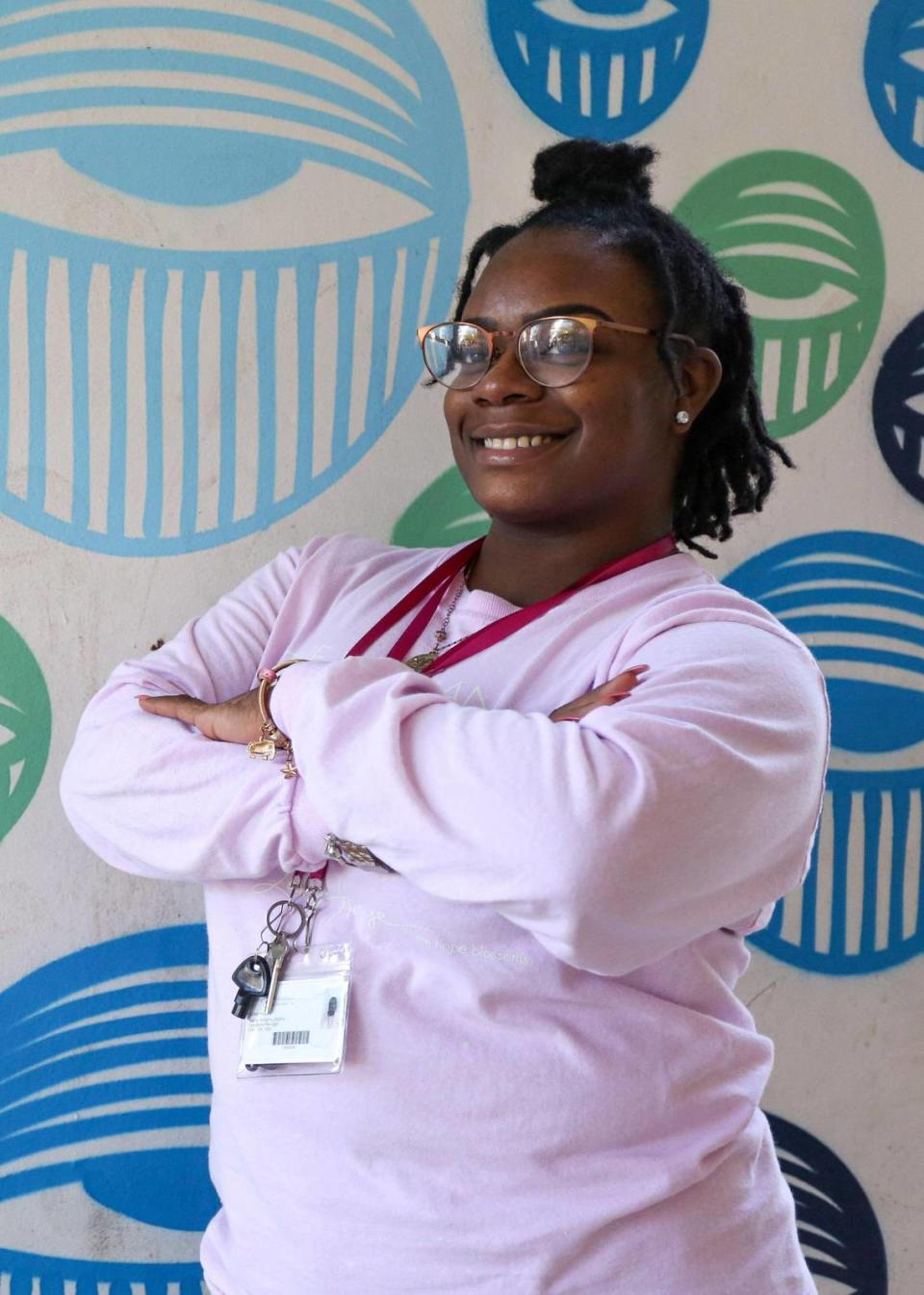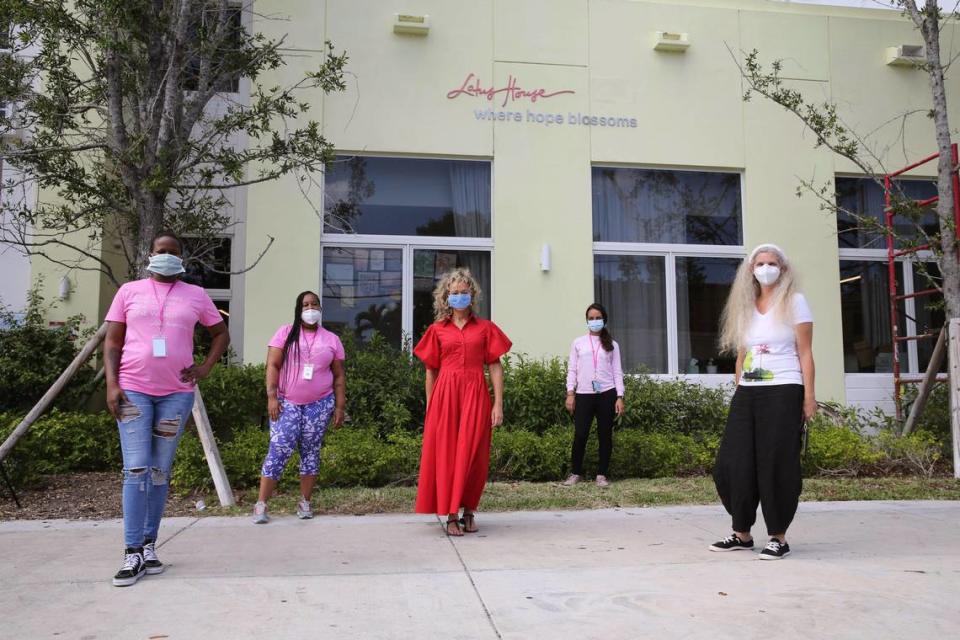Domestic violence survivors need more help than ever during pandemic
Somy Ali’s cellphone doubles as a lifeline for domestic violence survivors.
On a typical day she takes about a dozen calls, including ones from victims, law enforcement agencies and other advocates. At the peak of the pandemic lockdown period, she was going through about 50 calls daily.
“It’s been crazy. We’re a salary-free nonprofit. I answer the calls and I do all the field work,” said Somy Ali, founder of No More Tears in Broward County, which aids domestic violence and human-trafficking victims. “I call us the second responders. The crime happens, and we provide all the services they need.”
The economic and social impacts of the pandemic are being felt by organizations focused on helping victims of domestic violence. Funding struggles, a shrinking volunteer pool and transferring services to new platforms have made the complex task of empowering victims even more complicated.
“We lost most of our volunteers who were regularly helping us, and at the same time our donors were struggling.” said Lotus House president Constance Collins. “It’s been economically challenging in the pandemic. While homeless shelters or domestic violence shelters were not getting any recognition as first responders, the reality is we all are essential.”
In the U.S. nearly 1 in 4 women and about 1 in 7 men report experiencing severe physical violence from an intimate partner in their lifetime, according to the National Coalition Against Domestic Violence.
The Centers for Disease Control and Prevention says social isolation, financial and emotional stress, lack of childcare and loss of income can cause spikes in domestic violence — many of these risk factors have been prevalent since the pandemic began. In addition, lockdown orders designed to keep people safe from COVID-19 have left some victims trapped at home with their abusers and unable to ask for help.
“At the beginning of the pandemic we heard nothing,” said Liz Regalado, executive director of Miami-Dade County’s Domestic Violence Oversight Board. “It was quite eerie because we knew women and male victims were locked up with their batterer.”
In unincorporated Miami-Dade, police said, calls for domestic assaults were lower in March when compared to 2019, but calls regarding domestic disturbances jumped nearly 20 percent. The Broward Sheriff’s Office says calls for domestic disturbances dropped about 5 percent in March 2020, compared to the year before, and by April they’d dipped almost 14 percent.
“Often women will remain in abusive situations in order to keep a roof over their head,” Collins said. “Women will remain in abusive situations until it’s time to go, and that means they risk losing their lives.”
Loss of jobs , housing has led some to return to their abuser
Francesco Duberli, who serves as the CEO of Survivors’ Pathway, says a lack of affordable housing and financial stability is even causing some survivors to return to their abuser.
“It’s the most devastating thing we’ve seen,” he said. “They overcame the violence and started the process of empowerment and in one day to another, they lost everything they’ve worked for. They would call us and say, ‘Where can I find a job? I need to go back to him.”
Survivors’ Pathway focuses on helping marginalized communities overcome violence. Duberli says about 5 to 10 percent of people who turn to them for assistance need it urgently.
“If you want to donate to us donate rice, beans, cans, everything related with food is good,” he said. “If you have a computer that’s in good condition you can donate it to us because technology is becoming a challenge for people. Housing is becoming problematic and that’s an expensive issue to resolve. It’s a big issue right now.”
Despite uncertain times organizations across South Florida remain committed to their cause.
Destiny Williams spent the lockdown period working two security jobs, while living with her family.
“It was hectic with the bills, the arguments and things like that,” said Williams, who grew up in Miami Gardens. “I had to really think about it. We’re in a pandemic and I have nowhere to go and financially right now it’s not stable and it’s not safe. I have to do something.”
Turning to Lotus House
Williams, who is in her 20s, says a lack of family support, emotional support and little stability made her turn to the Lotus House for help. She knew of their work supporting children and families escaping homelessness and domestic violence, and thought they could help.
Since arriving in June, Williams has begun studying for the GED, made a goal to become a social worker, and is working as an operations manager with the Lotus House.

“It was very important for me to find stability at a time when it was hard to get back on my feet and I had no one to turn to,” said Williams. “Once I entered there, it was love. It was like family. After the two weeks it was as if I knew everyone for so long and I had that support system.”
Being the youngest of seven children, Williams says her 13 nieces and nephews constantly push her to make positive changes in her life.
“The joy they bring me,” she said. “I can’t stop. I gotta keep going and it’s not for anybody else, it’s for them. I am the one who they are looking up to. In the back of my head I can’t fail, I can’t stop. They’re what keeps me going, every ‘Auntie, Hi.’”

Community support is critical to supporting South Florida’s homeless and domestic violence populations — and the pandemic hasn’t made getting donations easy.
“This is gonna be years of recovery and lean times for all of us especially for those at the bottom of social economic status,” Collins said. “As a community if there is anything we learned from this, it’s that we are one and if some of us have lost our homes or educational opportunities, then we all suffer. We do have to come together.”
Funds needed to help domestic violence victims
The Nur House, which primarily caters to the needs of South Florida’s Muslim population, held a digital fundraiser in October to mark its 10th anniversary.
“We are trying to engage our regular donor base because there is an increase demand,” said Mishka Ahmad, manager and survivors advocate with the Nur Center. “Domestic violence is all about power and control. These resources are for people who have nowhere else to turn. A lot of times they have no family help.”
Ahmad reminds donors that their dollars are going towards rebuilding lives.
“We help them get a driver’s license, get work, take English classes, and all those things cost money and resources are needed,” she said.
Her son started dancing after his mother started a new life
Pooja – who declined to give her last name for safety concerns — reached out to No More Tears over the summer wanting to escape an abusive husband.

With the help of the organization, she got a restraining order and fled with her 8-year-old son. Since starting over, the 42-year-old is now living in an apartment and is heading back to school to become an esthetician.
She’s also learned to become independent. While with her husband, Pooja wasn’t allowed to wear jeans, touch a thermostat or be involved with her child’s schooling. No More Tears has empowered her to do all of those things.
“My life totally changed. I feel I came into this world again with my new life. I am so happy and my son is so happy.”
Ali says she’s noticed a positive shift as well.
“I took them out to this Indian place and the son started dancing while we’re eating and she started bawling,” Ali said. “He was physically celebrating his freedom.”
Ali says the pandemic has impacted her donor base with No More Tears, but she kept most of the operations running thanks to an anonymous donation from a foundation.
“Because of this foundation I was able to get hotel rooms and get victims food,” Ali said. “If it weren’t for them, we wouldn’t be able to save as many people as we did.”
But more support is needed.
The University of Miami School of Law’s Human Rights Clinic has partnered with the Domestic Violence and Sexual Assault Council of Miami-Dade County to collect information about domestic violence nonprofits. Researchers hope their findings will, in part, be used to develop policy recommendations.
So far, 41 service providers took the survey and 20 interviews have been conducted.
Early data also shows almost half of responding providers report their clients are, overall, less safe than when the pandemic began. Researchers say over half of responding providers report the kind of service requests has changed since the pandemic started, with rental assistance, housing and direct financial assistance being the greatest needs.
“Access to public transportation, childcare, schooling, those issues are top of mind for most survivors right now,” Caroline Bettinger-López, director of University of Miami School of Law Human Rights Clinic said. “We need to look at all of the places survivors say they need help.”
In Broward County, Women in Distress has been using technology to expand its efforts.
“We’ve learned to use social media platforms more effectively and work through different groups and channels,” said Mary Riedel, outgoing president of Women in Distress. “We hope we can resume and expand these services we have been doing. It’s a testament to our staff that we’ve been able to extend our program.”
Riedel said the pandemic has presented “challenging times,” but those who work with victims are up for the work ahead.
“We’re focused on reaching survivors and letting people know help is a phone call away,” she said. “Domestic violence doesn’t take a hiatus.”
How to get help
No More Tears
Visit: https://nomoretearsusa.org/
Direct Line: 954-324-7668
Crisis Line: 954-324-7669
Email: SOMY@NOMORETEARSUSA.ORG
Lotus House
Visit: https://lotushouse.org/
Phone: 305-438-0556
Email: needshelter@lotushouse.org
Survivors’ Pathway
Visit: https://survivorspathway.org/
Phone: 786-275-4364
Email: info@survivorspathway.org
Nur House
Visit: https://nurcenterfl.org/
Phone: 1-866-278-6NUR (687)
Email: Nurcenterfl@gmail.com
Women in Distress of Broward County
Visit: https://www.womenindistress.org/
Phone: 954-760-9800
Crisis Hotline: 954-761-1133
Email: info@womenindistress.org
Florida Domestic Violence 24-Hour Crisis Hotline: 1-800-500-1119
Miami-Dade County Coordinated Victims Assistance Center: 305-285-5900


